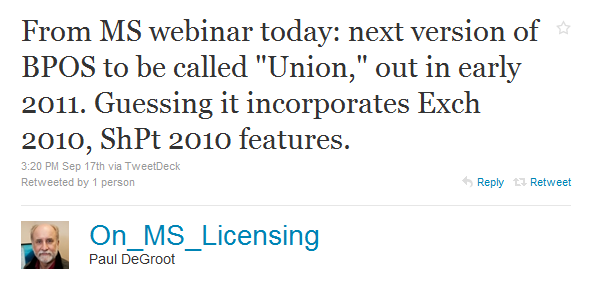Microsoft seeks to unify its coming Microsoft 'Union' Services, ERP and CRM wares

Earlier this summer, Microsoft officials shared roadmaps for what's coming next with the company's bundle of enterprise online services, currently known as Business Productivity Online Suite (BPOS). But there was little, if any, mention of what the company is doing to bring its CRM and ERP products in line with its Microsoft-hosted service offerings.
Surprise! There actually is a grander plan. I had a chance to hear a couple of new tidbits from Michael Park, Corporate Vice President of Microsoft's Business Solutions team, when he visited New York on press tour recently. I also gleaned a bit more from various bloggers who listened to a Microsoft Webcast for its "Cloud Champion" partners.
First, it seems there's a new brand-name coming. According to Directions on Microsoft researcher Paul DeGroot, Microsoft told partners last week that BPOS (which, more than a few Microsoft critics have referred to as "Big Piece of S*it") is about to be renamed "Union."
I asked Microsoft officials to confirm this and they wouldn't, claiming it was in the "rumors and speculation" category. I won't be surprised to see the Union name unveiled soon -- maybe as soon as the next month or two, when Microsoft fields its promised test version of BPOS v.Next.
Secondly, in order to get its reseller partners to step up their push to sell BPOS/Union, Microsoft is sweetening the deal, doubling the margins for those who sell the hosted bundle.
Now on to the bigger picture. We know that Microsoft is working on refreshing the entire BPOS/Union bundle with the many of the latest features it introduced in the on-premises versions of these products (Exchange Server 2010, SharePoint 2010, and, before the end of this year, Lync Server 2010). We also know that's when Microsoft is going to add some management and other refinements, including two-phase authentication support for the suite. (Two-phase authentication was announced with much fanfare by Google for its Google Apps suite on September 20.)
But there are other things happening under the BPOS/Union covers, too, Microsoft's Park told me, that should give Microsoft more of a unified story across its enterprise apps and services.
Microsoft's plan is to follow BPOS's lead with its ERP and CRM products, Park said. That means the Dynamics products and the BPOS services with use the same payments and commerce infrastructure. These payment and commerce components will be built on top of Windows Azure and Azure's service bus (the AppFabric), Park said. Microsoft plans to introduce support for this unified payments and commerce infrastructure to the next releases of its GP, NAV and AX ERP wares, he said.
Microsoft also is planning to unify the underlying infrastructure supporting BPOS and CRM, Park said. In the longer term, Microsoft is likely to add CRM to its BPOS bundle, though it's not clear whether the company will do so by making it an optional add-on or in some other way, he said. Though Park didn't provide a clear-cut timetable for this, it sounded like the goal is to have this happen in the next one to two years.
In the even longer term, Microsoft is working to add hosted ERP workloads to its mix of supported Online Services, Park said. That would entail somehow wrapping ERP elements as services and provisioning these instances using Windows Azure, he said.
Microsoft is taking increasing steps to bring the same kind of unity to its ERP suite that Oracle is touting this week at its Open World conference with Fusion. Although the Softies are attempting to cast doubt on how open Fusion will be and how it will protect customer investments, Microsoft is probably going to face those same kinds of questions as it rolls out its broader unification plan.
I'm curious what else current and potential Microsoft enterprise customers want to know about Microsoft's future plans for BPOS and Dynamics. Got anything you're wondering/worrying about (beyond online service uptimes, that is)?
